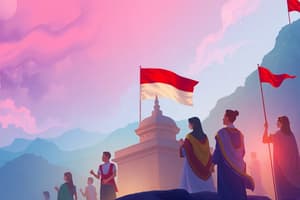Podcast
Questions and Answers
Apa yang dipromosikan oleh Bhinneka Tunggal Ika?
Apa yang dipromosikan oleh Bhinneka Tunggal Ika?
Pemahaman, toleransi, dan penerimaan di antara individu-individu
Bagaimana Bhinneka Tunggal Ika memungkinkan Indonesia menjadi masyarakat multi-etnis?
Bagaimana Bhinneka Tunggal Ika memungkinkan Indonesia menjadi masyarakat multi-etnis?
Setiap kelompok mempertahankan identitasnya sambil berkontribusi pada keseluruhan bangsa.
Apa contoh konkret dari kerukunan antaragama di Indonesia?
Apa contoh konkret dari kerukunan antaragama di Indonesia?
Kehidupan harmonis antara mayoritas Hindu di Bali dengan minoritas Muslim.
Apa yang menjadi tantangan dalam menerapkan Bhinneka Tunggal Ika di Indonesia?
Apa yang menjadi tantangan dalam menerapkan Bhinneka Tunggal Ika di Indonesia?
Kebinekaan merupakan salah satu aspek penting dalam pengantaran dan penyajian informasi bagi setiap individu. Sebagai fenomena buatan manusia, kebinekaan memiliki dampak positif dan ______.
Kebinekaan merupakan salah satu aspek penting dalam pengantaran dan penyajian informasi bagi setiap individu. Sebagai fenomena buatan manusia, kebinekaan memiliki dampak positif dan ______.
Apa yang dikritik terkait dengan penerapan Bhinneka Tunggal Ika?
Apa yang dikritik terkait dengan penerapan Bhinneka Tunggal Ika?
Dalam konteks politik Indonesia, kebinekaan dapat digunakan untuk mempromosikan pluralisme budaya dan toleransi beragama dalam lingkungan yang ______.
Dalam konteks politik Indonesia, kebinekaan dapat digunakan untuk mempromosikan pluralisme budaya dan toleransi beragama dalam lingkungan yang ______.
Nasionalisme merupakan salah satu faktor yang mempengaruhi ______ di Indonesia, termasuk disekretaris otonomia di beberapa organisasi alumni di Jakarta.
Nasionalisme merupakan salah satu faktor yang mempengaruhi ______ di Indonesia, termasuk disekretaris otonomia di beberapa organisasi alumni di Jakarta.
Bhinneka Tunggal Ika merupakan istilah unggulan dalam mengartikan toleransi beragama, persatuan dalam keberagaman, kebinekaan, dan ______.
Bhinneka Tunggal Ika merupakan istilah unggulan dalam mengartikan toleransi beragama, persatuan dalam keberagaman, kebinekaan, dan ______.
Ideologi ini telah mempengaruhi struktur politik Indonesia dan juga dipatenkan dalam praktik setiap individu dengan mempersiapkan mereka untuk iklim ______ dalam konteks sehari-hari.
Ideologi ini telah mempengaruhi struktur politik Indonesia dan juga dipatenkan dalam praktik setiap individu dengan mempersiapkan mereka untuk iklim ______ dalam konteks sehari-hari.
Study Notes
Bhinneka Tunggal Ika: Indonesia's Celebration of Cultural Diversity
Indonesia is a vast archipelago nation composed of over 17,500 islands, each with its own unique cultural traditions and practices. This diverse landscape results from centuries of human migration, trade, and cultural exchange between different ethnicities, religions, and languages. One of the most significant aspects of this multiculturalism is reflected in the country's national motto, "Bhinneka Tunggal Ika," which translates to "Unity in Diversity".
Evolution of Bhinneka Tunggal Ika
The phrase "Bhinneka Tunggal Ika" was first used by the 19th-century Javanese statesman Prince Diponegoro, who fought against Dutch colonial rule. He encouraged his followers to unite under his banner despite their differences, symbolized by the imagery of a single feather fan made up of many petals. This concept became more widely recognized during the Indonesian National Revolution in the 1940s when it was adopted by the Republic of Indonesia as a symbol of unity amidst various political factions. Since then, it has been enshrined in Indonesia's constitution as part of the Pancasila state ideology.
Embrace of Cultural Difference
At the heart of Bhinneka Tunggal Ika lies a profound respect for the plurality of cultures within Indonesia. This philosophy acknowledges that while all people may have different beliefs, customs, and behaviors, they can still live together peacefully and cooperatively. It promotes understanding, tolerance, and acceptance among individuals regardless of their backgrounds.
This approach has allowed Indonesia to foster a multiethnic society where each group maintains its distinct identity while contributing to the overall fabric of the nation. For example, the Hindu majority in Bali coexists peacefully with Muslim minorities, while the Minangkabau people in West Sumatra practice matrilineal inheritance and matriarchal leadership inherent in their culture.
Challenges and Controversies
Despite its emphasis on inclusivity, Bhinneka Tunggal Ika has faced challenges related to religious tensions and intercommunal conflicts throughout Indonesia's history. These issues arise due to the complexity of managing such a diverse population and ensuring equal rights for all citizens. Furthermore, some critics argue that the principle lacks practical implementation because it often leads to a 'might is right' situation, where dominant groups impose their values upon others.
However, these concerns do not negate the importance of Bhinneka Tunggal Ika as a guiding principle for the country. Instead, they highlight the ongoing need for continuous efforts towards achieving true harmony amidst diversity.
Conclusion
In conclusion, Bhinneka Tunggal Ika represents a unique aspect of Indonesian identity and politics. By embracing cultural difference and fostering a sense of unity, Indonesia demonstrates the potential for peaceful coexistence even among groups with profoundly distinctive ways of life. While challenges persist, the spirit embodied by this principle continues to inspire hope for a future characterized by mutual respect and cooperation across cultural boundaries.
Studying That Suits You
Use AI to generate personalized quizzes and flashcards to suit your learning preferences.
Description
Explore the concept of 'Bhinneka Tunggal Ika' in Indonesia, which promotes unity amidst the country's diverse cultural landscape. Learn about the historical evolution, embrace of cultural differences, challenges, and controversies surrounding this principle.




